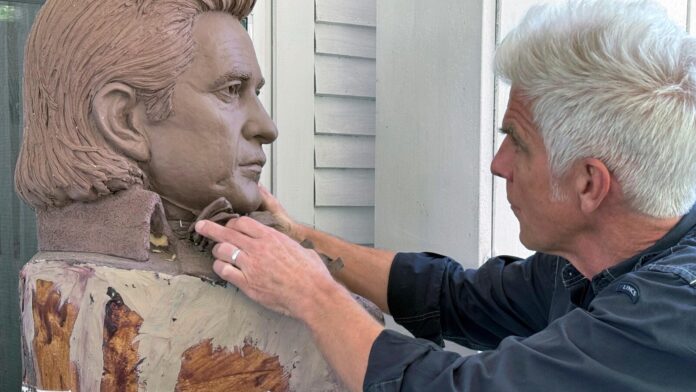LITTLE ROCK, Ark. — When Arkansas lawmakers decided five years ago to replace the statues representing the state in the U.S. Capitol, there was little objection to getting rid of the existing sculptures. The statues that stood there for more than 100 years were obscure figures in the state’s history.
“I remember giving tours to Arkansas voters, to young people, and I point out the two representatives in Statuary Hall in our United States Capitol from Arkansas,” said former Governor Asa Hutchinson, who also served in Congress . “And they said, ‘We’ve never heard of them.’”
Instead of two little-known figures from the 18th and 19th centuries, the state will soon be represented by the ‘Man in Black’ and a woman who played a major role in the fight against school desegregation.
Officials plan to install statues of civil rights leader Daisy Bates this week and musician Johnny Cash later this year.
Bates, who headed the state NAACP, mentored the black students known as the Little Rock Nine who integrated Central High School in 1957. She is a well-known civil rights figure in Arkansas, where a downtown street in the capital, Little Rock, is named in her honor. The state also marks Daisy Bates Day on Presidents Day.
Benjamin Victor, the Idaho sculptor chosen to create Bates’ statue, said he began his work by studying her extensively, including reading her 1962 autobiography and visiting her Little Rock home and Central High . He said he hopes the statue will also help visitors to the U.S. Capitol learn more about her.
“I hope it inspires them to study the life and legacy of Daisy Bates first and foremost,” Victor said. “A big part of that is capturing that spirit of hers and inspiring others to do the same and stand up for what’s right.”
The 8-foot-tall bronze statue depicts Bates, who published the Arkansas State Press newspaper with her husband, walking with a newspaper in her arm. She holds a notebook and pen in one hand and wears an NAACP pin and rose on her lapel.
Cash was born in Kingsland, a small town about 60 miles south of Little Rock. He died in 2003 at the age of 71. His achievements include 90 million records sold worldwide, spanning country, rock, blues, folk and gospel. He was one of the few artists to be inducted into both the Country Music Hall of Fame and Rock & Roll Hall of Fame.
The 8-foot statue of Cash shows the singer with a guitar on his back and a Bible in his hand. Little Rock sculptor Kevin Kresse, who was selected to create the statue, has sculpted other Arkansas musical figures such as Al Green, Glen Campbell and Levon Helm.
Kresse sees Cash as a much-needed addition to the Capitol to counterbalance the conflict in Congress, he said.
“He walked the walk and he lived what he believed. And it was precisely this quality that really appealed to me,” says Kresse. “And I really wanted to bring out that inner thoughtfulness in this image.”
The statues of Bates and Cash will replace the statues of James P. Clarke, a former governor and U.S. senator in the late 19th and early 20th centuries, and Uriah Rose, a 19th century lawyer. The footage had come under scrutiny, mainly because of racist comments Clarke made calling on the Democratic Party to uphold “white norms.”
Republican Sen. Bart Hester, a Republican who is now president pro tem of the Senate, called for the statues to be replaced in 2018. Clarke Tucker, Clarke’s great-grandson and a Democratic senator, also called for his ancestor’s statue to be replaced. come down.
“There was widespread recognition that it was time for change,” said Hutchinson, who signed the 2019 law mandating the erection of the Bates and Cash statues.
Choosing their replacements was the toughest part, with lawmakers offering competing ideas ranging from Walmart founder Sam Walton to an out-of-state Navy SEAL killed in Afghanistan. After some wrangling, lawmakers ultimately approved Bates and Cash.
Sen. David Wallace, who sponsored legislation to replace the previous sculptures, said he hoped the new statues would tell people more about the types of figures Arkansas has produced over the years.
“We wanted to represent the everyday person who represented Arkansas,” Wallace said. “And I think we covered the spectrum in Arkansas with Daisy Bates and with Johnny Cash. They just represent the common people of Arkansas.”
___
Associated Press reporter Mike Pesoli contributed to this report.



